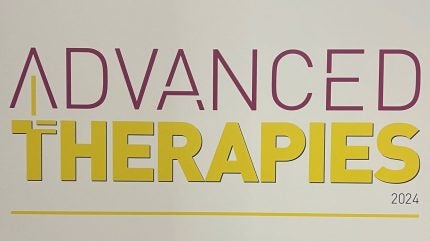Delivery and manufacturing hurdles remain in the cell and gene therapy
2024-03-21
细胞疗法免疫疗法

Preview
来源: Pharmaceutical Technology
The Advanced Therapies 2024 conference in London. Credit: Irena Maragkou/Globaldata.
The current prospects and obstacles in the cell and gene therapy space were the key focus of a panel at the Advanced Therapies conference, which took place on 19-20 March in London, UK.
During the panel session entitled ‘Autologous versus allogeneic?’ four experts discussed the development challenges of allogeneic cell therapies such as the risk of rejection, integration barriers and the need for further engineering to make allogeneic therapies hyper-immunogenic.
Stefanos Theoharis, CEO of OneChain Immunotherapeutics, which is developing chimeric antigen receptor (CAR)-T therapies, said: “In theory, allogeneic cell therapies have all the advantages, are cheaper and immediately available for the patient.”
He added that during the early days of autologous cell therapies, 30% of patients were not able to receive autologous cell products, either due to disease progression or death before the completion of the manufacturing process. In comparison, allogeneic therapies can be manufactured faster.
In this oncology space, “a one-size-fits-all approach is unlikely to be successful,” said Raphael Ognar, president, chief executive officer and co-founder of the cell therapy biotech NKILT Therapeutics. Current cell therapy methods have several limitations, including accessibility issues and the need for more cost-effective and efficient manufacturing processes. With autologous cell therapies, Ognar said: “Their big Achilles’ heel is that you can only manufacture them in a handful of centres in Europe, and maybe two handfuls of centres in the US.” He added that this will pose a challenge when tackling common cancers such as lung, breast and prostate cancer.
See Also:
Capstan secures $175m Series B funds for CAR-T therapy

Preview
来源: Pharmaceutical Technology
Delivery tech remains challenging with gene therapies for brain disorders

Preview
来源: Pharmaceutical Technology
Ognar concluded that the way forward is to find the most adaptive approach that will best suit a particular type of cancer. In some cases, allogeneic therapies could keep the patient cancer-free until clinicians find the next treatment step, while in other cases, autologous therapies will be best suited as the only treatment that will have the patient responding to therapy, he said.
Lindsay Davies, CSO at Swedish biotech NextCell Pharma, highlighted the need to understand the environmental factors that impact how these diseases are evolving and then assign therapies that will provide longevity and commercial applicability.
更多内容,请访问原始网站
文中所述内容并不反映新药情报库及其所属公司任何意见及观点,如有版权侵扰或错误之处,请及时联系我们,我们会在24小时内配合处理。
靶点
-药物
-热门报告
立即开始免费试用!
智慧芽新药情报库是智慧芽专为生命科学人士构建的基于AI的创新药情报平台,助您全方位提升您的研发与决策效率。
立即开始数据试用!
智慧芽新药库数据也通过智慧芽数据服务平台,以API或者数据包形式对外开放,助您更加充分利用智慧芽新药情报信息。




